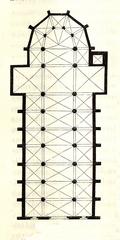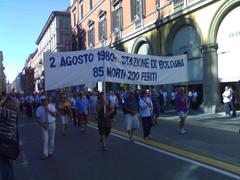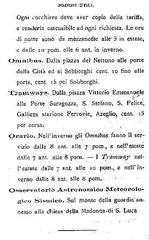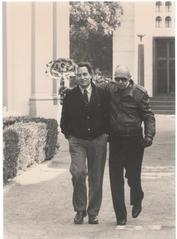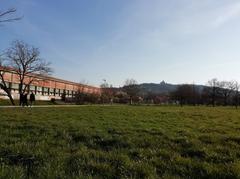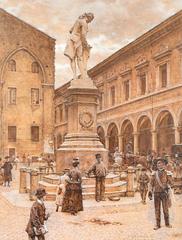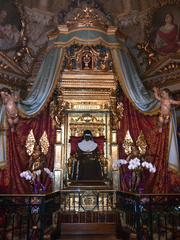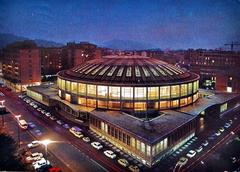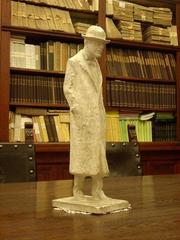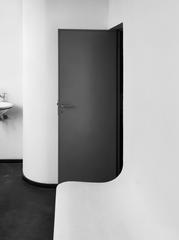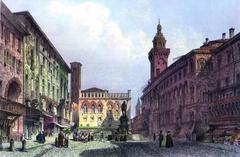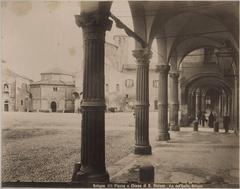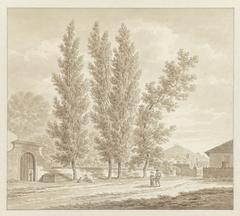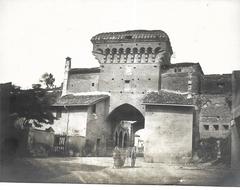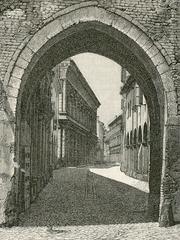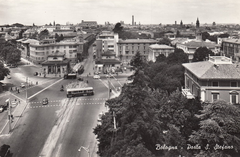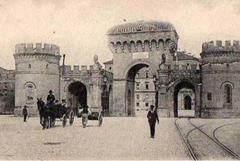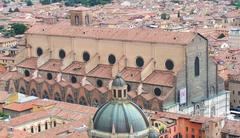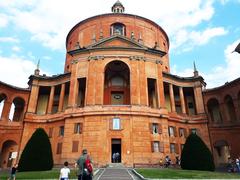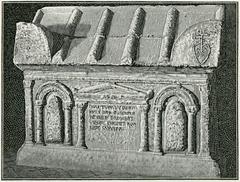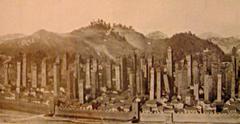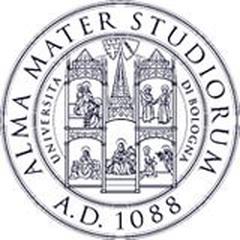Università di Bologna Museo di Fisica: Visiting Hours, Tickets, and Guide to Bologna Historical Sites
Date: 14/06/2025
Introduction
Nestled in the heart of Bologna, Italy, the Museo di Fisica at the Università di Bologna offers an immersive exploration of centuries of scientific discovery. As part of the world’s oldest continuously operating university, founded in 1088, the museum showcases the pivotal role Bologna has played in the evolution of physics and scientific thought in Europe. Housed within the historic Palazzo Poggi and the university campus at Via Irnerio 46, this museum is both a scholarly archive and an engaging educational resource. Visitors can admire an extraordinary collection of scientific instruments and artifacts, from Renaissance-era apparatus to modern experimental devices, and learn about trailblazing figures such as Laura Bassi—the first woman to earn a university degree and professorship in physics—and Augusto Righi, whose research in electromagnetism paved the way for advances in radio technology.
Whether you are a science enthusiast, student, historian, or traveler, this guide provides comprehensive visitor information—including Museo di Fisica visiting hours, ticket options, accessibility details, and suggestions for guided tours—while highlighting nearby attractions to enrich your Bologna experience. For further details, visit the Università di Bologna Museo di Fisica page and the Museum of Palazzo Poggi website.
Table of Contents
- Introduction
- Historical Background: Origins and Evolution of the Museo di Fisica
- The University’s Scientific Legacy
- Key Collections and Historical Artifacts
- Visiting the Museo di Fisica: Hours, Tickets, and Accessibility
- Nearby Attractions and Travel Tips
- Visuals and Interactive Elements
- FAQ: Common Questions About Museo di Fisica
- Conclusion
- References
Historical Background: Origins and Evolution of the Museo di Fisica
The Museo di Fisica at the Università di Bologna reflects the city’s deep tradition of scientific inquiry. Although the university was founded in 1088 (Wikipedia), the museum itself originated in the late 1970s, when the Department of Physics began curating and restoring scientific instruments and documents amassed over centuries (Unibo Official Site). The initial collection grew through acquisitions and donations from academic and private sources, underscoring the university’s commitment to preserving the material culture of physics and scientific education.
The University’s Scientific Legacy
The Università di Bologna is renowned as a cradle of Western academia, nurturing visionaries like Nicolaus Copernicus, Luigi Galvani, and Guglielmo Marconi (Britannica). The university was also a pioneer in gender equality in academia, appointing Laura Bassi as the first female physics professor in 1732 (Wikipedia). The museum acts as a living archive, connecting visitors to the university’s rich history of scientific achievement and innovation.
Key Collections and Historical Artifacts
The Museo di Fisica’s collections span from the 18th to the 20th centuries and include:
- Experimental Physics Instruments (19th Century): Devices illustrating the transition from classical to modern physics.
- Augusto Righi’s Equipment: Apparatus used in foundational electromagnetism and radio wave experiments (Archivio Storico Unibo).
- Quirino Majorana’s Devices: Tools significant in radiocommunications and physics research.
- School of Radiocommunications Apparatus: Exhibiting Bologna’s leadership in radio technology.
- 18th-Century Instruments at Palazzo Poggi: Rare artifacts from the Enlightenment era (Museionline).
These collections not only document the evolution of physics but also reflect scientific pedagogy and craftsmanship.
Visiting the Museo di Fisica: Hours, Tickets, and Accessibility
Opening Hours
-
Via Irnerio 46 (Collezione di Fisica):
Monday to Friday: 9:00 AM – 5:00 PM
Closed on weekends and public holidays.
Official hours and updates. -
Palazzo Poggi (Main Museum):
Tuesday to Sunday: 10:00 AM – 6:00 PM
Closed on Mondays and major holidays.
Museum of Palazzo Poggi hours.
Tickets and Admission
- Collezione di Fisica: Free admission for all visitors.
- Palazzo Poggi Museum:
Free for University of Bologna students and staff, children and youth up to 19, visitors with disabilities, and Bologna residents.
Modest fee for other visitors, available for purchase online or onsite.
Accessibility
Both locations are wheelchair accessible and equipped with lifts and accessible toilets. For specific needs, contact the museum in advance (Museum of Palazzo Poggi: Tickets).
Guided Tours and Special Events
Guided tours (in Italian and English) are available by prior booking, offering rich insights into the collections. The museum hosts events, workshops, and educational activities throughout the year (Department of Physics and Astronomy: Events).
Photography
Photography is permitted for personal use in most areas; please check for restrictions.
Exhibit Layout and Visitor Experience
The Museo di Fisica’s instruments are displayed in glass cases throughout public spaces, blending museum exhibits with an active academic environment (WhichMuseum). Thematic and chronological presentations, explanatory panels (primarily in Italian), and occasional hands-on demonstrations enhance the visitor experience. Guided tours are recommended for non-Italian speakers.
Nearby Attractions and Travel Tips
- University of Bologna Historic Buildings: Experience the medieval campus and courtyards.
- Orto Botanico di Bologna: The university’s botanical garden.
- Museo di Zoologia and Museum of Palazzo Poggi: Explore additional scientific and cultural collections.
- Piazza Maggiore & Due Torri: Central Bologna’s vibrant squares and medieval towers.
Travel Tips:
Bologna’s city center is pedestrian-friendly and well-connected by public transport. Wear comfortable shoes and plan to combine your museum visit with other nearby sites.
Visuals and Interactive Elements
- High-quality images of key instruments (e.g., Wimshurst machine, optical benches).
- Maps pinpointing the Museo di Fisica and Palazzo Poggi.
- Virtual tour links and embedded video previews (SMA Unibo).
- Alt tags for images: e.g., “Wimshurst electrostatic machine at Collezione di Fisica Bologna”.
Frequently Asked Questions (FAQ)
Q: What are the visiting hours?
A: Via Irnerio 46: Mon–Fri, 9:00 AM–5:00 PM. Palazzo Poggi: Tue–Sun, 10:00 AM–6:00 PM.
Q: Is admission free?
A: Yes for the Collezione di Fisica; Palazzo Poggi offers free entry to certain categories, otherwise a small fee applies.
Q: Are guided tours available?
A: Yes, in Italian and English by advance booking.
Q: Is the museum accessible for people with disabilities?
A: Yes, with lifts and ramps.
Q: Can I take photos inside?
A: Yes, but check for restrictions in special exhibit areas.
Q: How do I get there?
A: Both sites are centrally located and accessible by public transport; parking is limited in the historic center.
Conclusion
The Museo di Fisica at the Università di Bologna is a remarkable destination for anyone interested in the history of science and the evolution of physics. With its extensive and meticulously curated collections, it offers an unparalleled journey through the milestones of scientific progress. The museum’s blend of accessibility, educational programming, and connection to other historic sites makes it an essential stop for cultural enrichment and academic exploration in Bologna.
Plan your visit using the official Museo di Fisica Bologna resources and the Museum of Palazzo Poggi websites. For the latest updates, download the Audiala app and follow museum channels on social media.
References
- University of Bologna - Wikipedia
- Museo di Fisica Bologna: History, Visiting Hours, Tickets, and Visitor Guide, Università di Bologna
- Britannica, University of Bologna
- Museo di Fisica Bologna: Visiting Hours, Tickets, History, and Travel Tips, SMA Unibo
- Visiting the Collezione di Fisica Bologna: Hours, Tickets & Historical Highlights, Museionline
- Museo di Fisica Bologna: Visiting Hours, Tickets, and Historical Insights, Museionline
- Bologna Welcome
- Department of Physics and Astronomy, Università di Bologna
- Museum of Palazzo Poggi
- WhichMuseum - Museo di Fisica Bologna
- Archivio Storico Unibo

